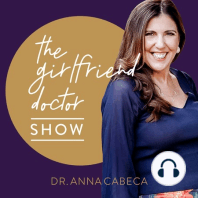33 min listen

How To Conquer Your Acid Reflux
How To Conquer Your Acid Reflux
ratings:
Length:
29 minutes
Released:
Oct 27, 2019
Format:
Podcast episode
Description
Acid reflux and GERD is a chronic stomach issue for many Americans, with growing numbers of people taking Prilosec or other long-term acid reflux medication for 10+ years. This is so unhealthy! Jenn Malecha, a holistic health coach, joins me to talk about why people get GERD and how they can correct their stomach issues. Jenn is a natural health coach who was diagnosed with skin cancer at the age of 26. This surprise diagnosis had no real external indicators that something was going wrong, but when she started looking at her hormones and internal health, she discovered that she has imbalances that contributed to her skin cancer, and later in life, to Hashimoto’s. What Jenn discovered when she took it upon herself to investigate her health was an overgrowth of H Pylori in her gut. She found the same bacteria in her father-in-law’s guts and has helped him come off the Prilosec he’d been on for over 10 years. Now, he only needs to worry about having acid reflux when he eats food that he has sensitivities to. I’d argue that the unlimited refill culture here in America is contributing to the prevalence of GERD (gastroesophageal reflux disease) and acid reflux because our stomachs are designed to produce acid to help digest our food. But if we’re dousing these fires with unlimited liquid, we’re not going to be digesting our food all that well. This is a similar problem that taking acid-reducing medication like Prilosec causes - reducing your stomach acid below healthy levels. So actually, you don’t have an overproduction of stomach acid, but an underproduction, which causes a whole host of health issues. What should we do to help our stomach acid production? Slow down while we’re eating our food, don’t drink too much with your meal, and fast overnight, including water, to give your digestion a chance to rest and reset. Have you been taking acid-reduction medicine for longer than 6 months? Do you take advantage of unlimited refills? Have you ever had your gut health checked out? In This Episode: How you can have internal hormonal imbalances that don’t show in your external symptoms What can an overgrowth of H Pylori cause in your body How food sensitivities can cause symptoms of acid reflux and GERD What impact having a large drink with your food is having on your stomach acid production How taking acid-reducing medication is actually ruining our stomach acid production Why you should slow down while you’re eating your food Quotes: “I recognize that the sun is my friend. I think that you still need to be careful when you go out in the sun because the ozone layer is not as dense as it used to be, so we do need to be careful - but it’s important to get sun exposure.” (8:49) “A lot of the traditional medical systems will run a breath test or blood test to look for H Pylori. I’ve found that there’s no such thing as the perfect test. Just because you get a negative on one of those tests doesn’t mean that you can rule it out if you’re still suffering from acid reflux or GERD.” (14:34) “What you’re experiencing today is an accumulation of everything that’s happened over your lifetime.” (25:20) Links Find Jenn Malecha Online Find Jenn Malecha on Instagram | YouTube | Facebook Check out the full episode page Find Dr. Anna Online Follow Dr. Anna on Facebook | Instagram | Twitter
Released:
Oct 27, 2019
Format:
Podcast episode
Titles in the series (100)
The Importance of Magnesium: his Mineral Deficiency Causes Heart Attacks, Arthritis, Diabetes, Cancer, Energy Deprivation… It’s perhaps the most important mineral in your body and yet… Scientists and high-level nutritionists are finding that 98% of people are deficient in thi by The Girlfriend Doctor w/ Dr. Anna Cabeca